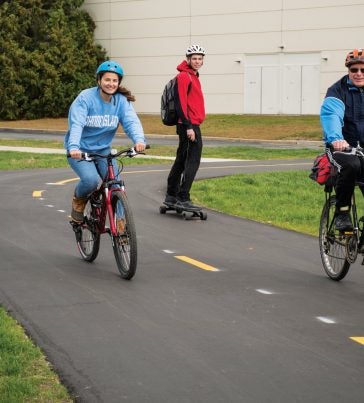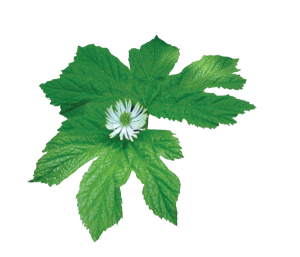
Recognition for William C. O’Neill ’57
On page 5 of the fall 2019 issue of URI Magazine, there was a photo of the newly completed addition to the William C. O’Neill Bike Path, a spur connecting the main path to the URI Kingston Campus. I was disappointed and surprised that the photo and the brief description did not include anything about the name of the bike path, especially since it is named after a URI alumnus, William C. O’Neill.
Bill was a member of the Rhode Island House of Representatives and later a member of the Rhode Island Senate. In addition to his URI degree, he held a master’s degree from Harvard University. I was a classmate and friend of Bill’s in Peace Dale Elementary School, South Kingstown High School, and URI. Shortly before Bill died in 2003 at the age of 72, a small group I was involved in suggested naming the South County Bike Path for Bill. Ted Wright of Narragansett pursued the matter and the path was officially named for Bill.
–Charles Sweet ’51
Consider Goldenseal
In response to a story in our spring 2019 issue, we received this message:

Goldenseal has medicinal properties similar to barberry, and its native range includes Rhode Island, although there are no known native populations. So you can tell people to harvest wild barberry, but if they want to grow their own medicine, plant goldenseal, but buy the planting stock from a cultivated source, not wild harvested. It is easy to grow but requires shade. There are a few other plants that also contain berberine.
–Dan Lawton ’88
Elizabeth Liebovitz, coordinator of URI’s College of Pharmacy Medicinal Garden, emphasizes our reader’s point about planting and not wild harvesting: “Wild goldenseal populations are vulnerable to overharvesting, so don’t harvest wild goldenseal! Plant it!” Same goes for American ginseng, she says. Liebovitz adds, “Harvesting plants for medicine is a big factor in threatening wild plant populations with overharvesting,” and offers unitedplantsavers.org as a resource for information about conserving medicinal plants.
Titles Matter
I enjoy reading about my alma mater and keeping current with exciting news from campus. In the fall 2019 issue the headline story about the engineering building was especially exciting to me. My husband was an electrical engineering major and for my Ph.D., I closely worked with Dr. Vinka Oyanedel-Craver of Civil and Environmental Engineering.
I noticed that in the front-cover foldout her title was noted as “assistant professor.” Dr. Oyanedel-Craver was actually promoted to full professor this summer, an achievement that marks her success in the field and as a faculty member. I strongly encourage you to correct this mistake ASAP, as the promotion to full professor occurs after a promotion to associate professor (from assistant) and therefore acknowledges a minimum of 10 years of service. This is no small feat, particularly for a woman in a male-dominated field. Titles are important and we all work for our advancements. Proper recognition of these titles is therefore important.
–Dr. Laura Schifman, Ph.D. ’14 and Brandon Spirito ’13
Thank you for your message and for pointing out the error in Professor Oyandel-Craver’s title. We absolutely recognize the years of hard work involved in being promoted through faculty ranks, and strive to recognize that and accurately reflect faculty titles in this publication. In spite of our best efforts to verify all names and titles through multiple sources, we clearly missed this one. We corrected it immediately in the online version of the story, and offer our apologies and this correction here, in print. We also acknowledge the point you make about women faculty in a male-dominated field. It is an important point and we thank you for raising it.
